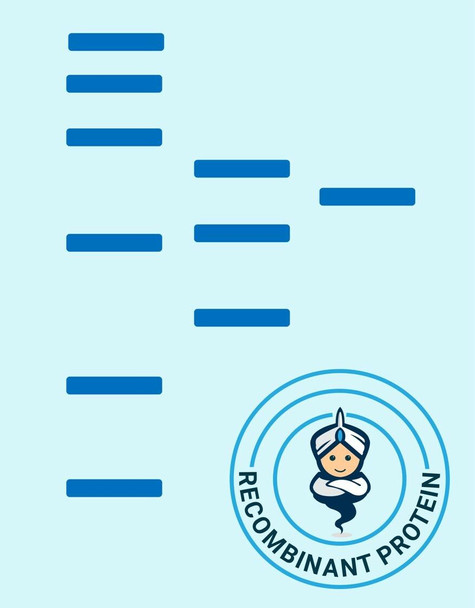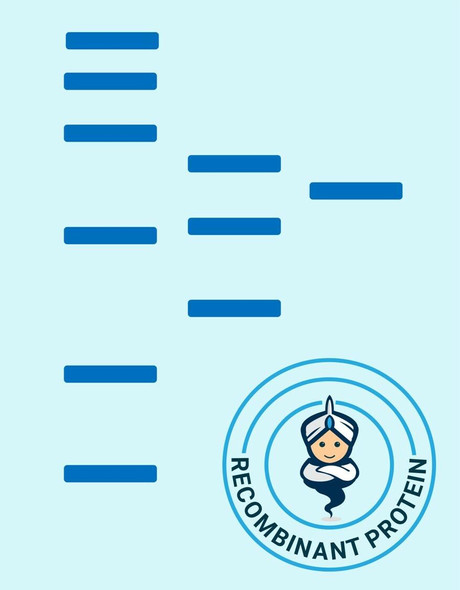Enzymes Recombinant Proteins
Human CDKN1A Recombinant Protein (RPPB2466)
- SKU:
- RPPB2466
- Product Type:
- Recombinant Protein
- Species:
- Human
- Uniprot:
- P38936
- Research Area:
- Enzymes
Description
| Product Name: | Human CDKN1A Recombinant Protein |
| Product Code: | RPPB2466 |
| Size: | 10µg |
| Species: | Human |
| Target: | CDKN1A |
| Synonyms: | Cyclin-Dependent Kinase Inhibitor 1A (P21, Cip1), Melanoma Differentiation Associated Protein 6, Wild-Type P53-Activated Fragment 1, CDK-Interaction Protein 1, DNA Synthesis Inhibitor, CDK-Interacting Protein 1, CDKN1, P21Cip1/Waf1, MDA6, P21CIP1, CAP20, WAF1, CIP1, PIC1, P21, SDI1. |
| Source: | Escherichia Coli |
| Physical Appearance: | Sterile Filtered colorless solution. |
| Formulation: | The CDKN1A solution contains 20mM Tris-HCl buffer (pH 8.0), 2M Urea, 0.1M NaCl and 10% glycerol. |
| Stability: | Store at 4°C if entire vial will be used within 2-4 weeks. Store, frozen at -20°C for longer periods of time. For long term storage it is recommended to add a carrier protein (0.1% HSA or BSA).Avoid multiple freeze-thaw cycles. |
| Purity: | Greater than 85.0% as determined by SDS-PAGE. |
| Amino Acid Sequence: | MGSSHHHHHH SSGLVPRGSH MSEPAGDVRQ NPCGSKACRR LFGPVDSEQL SRDCDALMAG CIQEARERWN FDFVTETPLE GDFAWERVRG LGLPKLYLPT GPRRGRDELG GGRRPGTSPA LLQGTAEEDH VDLSLSCTLV PRSGEQAEGS PGGPGDSQGR KRRQTSMTDF YHSKRRLIFS KRKP |
CDKN1A holds a key part in the cellular response to DNA mutation. CDKN1A overexpression causes cell cycle to stop. When collaborating with CDK2 complexes, CDKN1A aids to prevent kinase activity and inhibits progression through G1/S. Nevertheless, CDKN1A can additionally increase assembly and activity in complexes of CDK4 or CDK6 and cyclin D. CDKN1A is a vital intermediary by which p53/TP53 facilitates its part as an inhibitor of cellular proliferation as a reaction to DNA impairment.
CDKN1A Human Recombinant produced in E. coli is a single polypeptide chain containing 184 amino acids (1-164) and having a molecular mass of 20.2 kDa.CDKN1A is fused to a 20 amino acid His-tag at N-terminus & purified by proprietary chromatographic techniques.
| UniProt Protein Function: | p21Cip1: a cell-cycle regulatory protein that Interacts with cyclin-CDK2 and -CDK4, inhibiting cell cycle progression at G1. Its expression is tightly controlled by p53, through which this protein mediates the p53-dependent cell cycle arrest at G1 phase. |
| UniProt Protein Details: | Protein type:Inhibitor; Cell cycle regulation Chromosomal Location of Human Ortholog: 6p21.2 Cellular Component: cyclin-dependent protein kinase holoenzyme complex; cytosol; nucleoplasm; nucleus; perinuclear region of cytoplasm Molecular Function:cyclin binding; cyclin-dependent protein kinase activating kinase activity; cyclin-dependent protein kinase inhibitor activity; metal ion binding; protein binding; protein complex binding; ubiquitin protein ligase binding Biological Process: cell cycle arrest; cellular response to amino acid starvation; cellular response to extracellular stimulus; DNA damage response, signal transduction by p53 class mediator resulting in cell cycle arrest; DNA damage response, signal transduction by p53 class mediator resulting in induction of apoptosis; epidermal growth factor receptor signaling pathway; fibroblast growth factor receptor signaling pathway; G1/S transition of mitotic cell cycle; G2/M transition of mitotic cell cycle; innate immune response; mitotic cell cycle; negative regulation of apoptosis; negative regulation of cell growth; negative regulation of cell proliferation; negative regulation of cyclin-dependent protein kinase activity; negative regulation of phosphorylation; nerve growth factor receptor signaling pathway; organ regeneration; phosphoinositide-mediated signaling; positive regulation of B cell proliferation; positive regulation of fibroblast proliferation; positive regulation of programmed cell death; Ras protein signal transduction; regulation of cyclin-dependent protein kinase activity; regulation of protein import into nucleus, translocation; response to arsenic; response to corticosterone stimulus; response to DNA damage stimulus; response to drug; response to hyperoxia; response to organic nitrogen; response to toxin; response to X-ray |
| NCBI Summary: | This gene encodes a potent cyclin-dependent kinase inhibitor. The encoded protein binds to and inhibits the activity of cyclin-cyclin-dependent kinase2 or -cyclin-dependent kinase4 complexes, and thus functions as a regulator of cell cycle progression at G1. The expression of this gene is tightly controlled by the tumor suppressor protein p53, through which this protein mediates the p53-dependent cell cycle G1 phase arrest in response to a variety of stress stimuli. This protein can interact with proliferating cell nuclear antigen, a DNA polymerase accessory factor, and plays a regulatory role in S phase DNA replication and DNA damage repair. This protein was reported to be specifically cleaved by CASP3-like caspases, which thus leads to a dramatic activation of cyclin-dependent kinase2, and may be instrumental in the execution of apoptosis following caspase activation. Mice that lack this gene have the ability to regenerate damaged or missing tissue. Multiple alternatively spliced variants have been found for this gene. [provided by RefSeq, Sep 2015] |
| UniProt Code: | P38936 |
| NCBI GenInfo Identifier: | 729143 |
| NCBI Gene ID: | 1026 |
| NCBI Accession: | P38936.3 |
| UniProt Secondary Accession: | P38936,Q14010, Q6FI05, Q9BUT4, |
| UniProt Related Accession: | P38936 |
| Molecular Weight: | 18,119 Da |
| NCBI Full Name: | Cyclin-dependent kinase inhibitor 1 |
| NCBI Synonym Full Names: | cyclin-dependent kinase inhibitor 1A |
| NCBI Official Symbol: | CDKN1A�� |
| NCBI Official Synonym Symbols: | P21; CIP1; SDI1; WAF1; CAP20; CDKN1; MDA-6; p21CIP1�� |
| NCBI Protein Information: | cyclin-dependent kinase inhibitor 1 |
| UniProt Protein Name: | Cyclin-dependent kinase inhibitor 1 |
| UniProt Synonym Protein Names: | CDK-interacting protein 1; Melanoma differentiation-associated protein 6; MDA-6; p21 |
| Protein Family: | P21 prophage-derived protein |
| UniProt Gene Name: | CDKN1A�� |
| UniProt Entry Name: | CDN1A_HUMAN |






